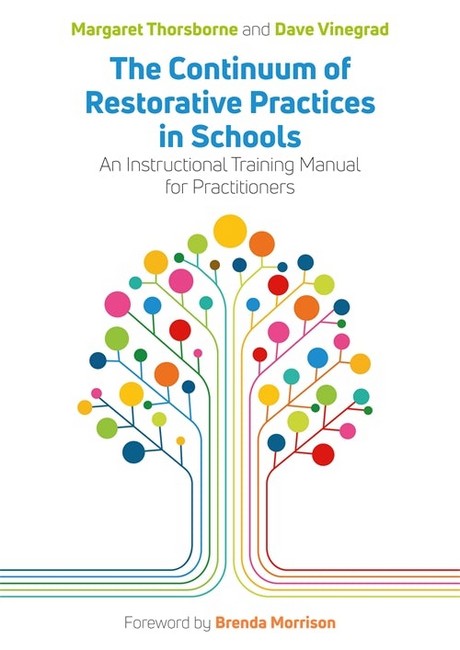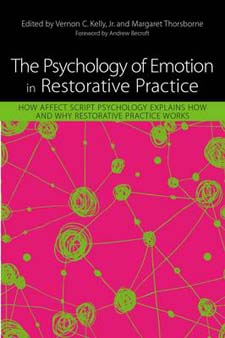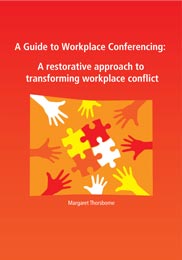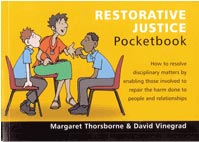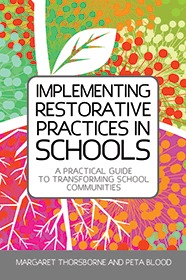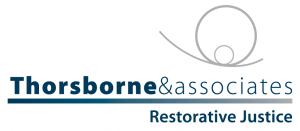We are proud
of our latest
publication.
Becoming a Trauma-informed Restorative Educator
Practical Skills to Change Culture and Behavior
View details of the publication
and how to purchase here
OTHER AVAILABLE TITLES
BECOMING A TRAUMA INFORMED RESTORATIVE EDUCATOR
Practical Skills to Change Culture and Behavior
By Joe Brummer and Margaret Thorsborne, Foreword by Dr. Lori Desautels (240pp)
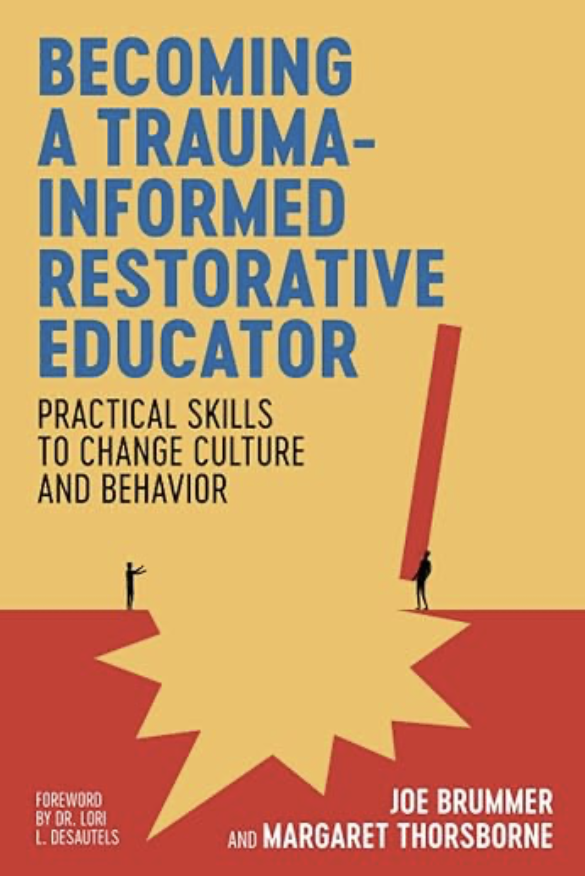
Maybe you have heard the terms trauma-informed and restorative – but how do you go about becoming a trauma-informed, restorative educator?
This practical book outlines the values, ideas and neuroscience behind trauma-informed restorative practice and its proven effectiveness. It clearly explains key theories relating to shame, trauma and your autonomic nervous system, and explains how to apply this knowledge in practice. Examples and stories of restorative practice feature throughout to inspire and emulate, as do practical protocols, tools and systems to develop your skills as a trauma-informed educator. Critically, it also explains the personal and professional qualities you need to nurture to truly engage in trauma-informed, restorative practice, with reflection points to aid learning and self-development.
Read this book and take your first steps to creating a trauma-informed, restorative classroom – even if your school isnt doing it!
Purchase Now
RESTORING RELATIONSHIPS
a program for middle school students
By Margaret Thorsborne, Beverley Turner and Sue Attrill (60pp)
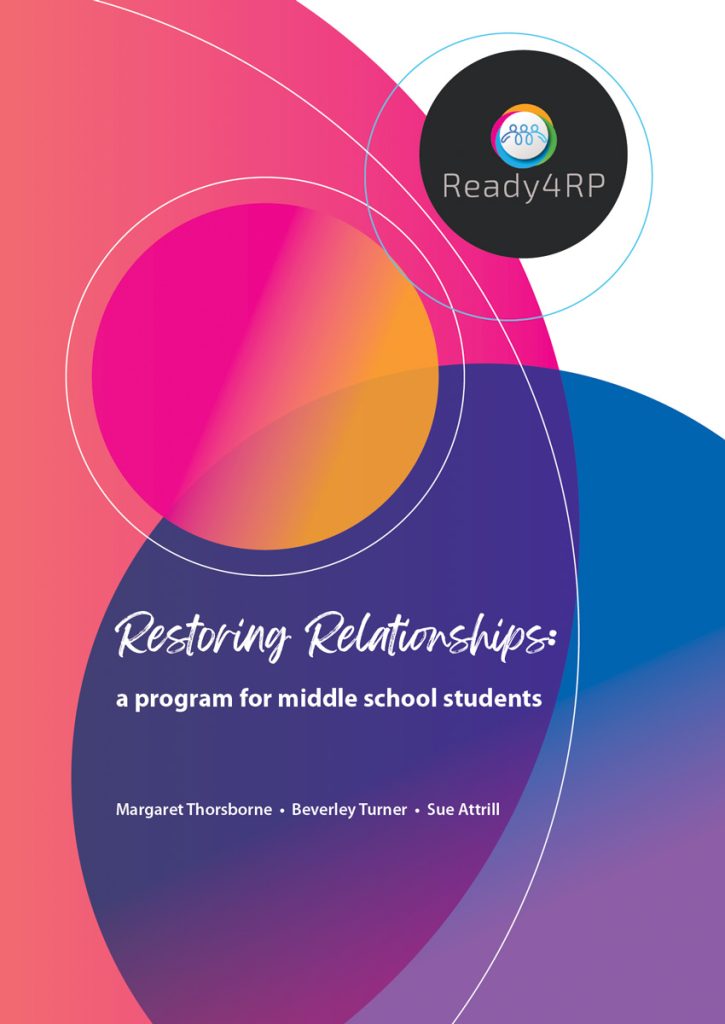
The Restoring Relationships resource has been designed to introduce some of the basic concepts of restorative problem-solving to middle years students, as they begin high school. If we are intent on school-wide RP implementation, we need to educate our student body, along with parents and caregivers, about what restorative problem solving actually is and how it works. It will work best if all students in a particular cohort understand the basic principles of the restorative approach, and have an opportunity to develop a degree of conflict competence – to pull back from making snap judgements and assumptions about others, understanding what’s happening for themselves, and knowing some basics about how to have brave conversations to resolve issues. Ruptures in relationships are inevitable – repair is optional. Our hope is that they might settle quickly into the routines of problem-solving in the high school and carry these skills through until they graduate – and beyond.
Purchase Now
THE CONTINUUM OF RESTORATIVE PRACTICES IN SCHOOLS
An Instructional Training Manual for Practitioners
By Margaret Thorsborne and Dave Vinegrad. Foreward by Brenda Morrison. (244pp)
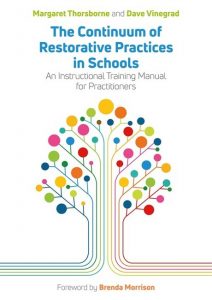
An instructional manual on restorative justice in schools from world-leading experts; this ‘how to’ guide offers guidance on the issues of carrying out restorative practices, including coping with day-to-day problems, and offers worksheets for practical daily use. Beginning with challenges to orthodox thinking about behaviour change, it goes on to describe a multitude of approaches to respond to minor incidents in school settings, then takes a close look at using restorative approaches to bullying, before it finally focuses on the formal end of the continuum (including conference preparation and facilitation). This book is reflective of the evolution of processes and responses from the most serious of incidents through to minor everyday issues, making this an essential resource for all school staff.
Purchase Now
GETTING MORE OUT OF RESTORATIVE PRACTICE IN SCHOOLS
Practical Approaches to Improve School Wellbeing and Strengthen Community Engagement
Edited by Margaret Thorsborne, Nancy Riestenberg and Gillean McCluskey. Foreword by Fania Davis.(280pp)
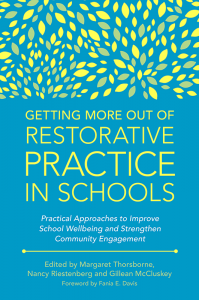
Split into three sections, the book first looks at implementation, readiness and evaluation. It then covers integrating RP with, and linking RP into, other issues relevant to schools such as trauma, poverty, and mindfulness, and finally shows how to work well with parents and families. The book gives proven strategies for measuring success and evaluating effectiveness. Overall, it provides insight into a variety of issues RP can help schools with, and addresses them in practical ways to help schools implement restorative practice to its full potential.
Purchase in Australia & New Zealand
Purchase in Europe/UK
Restorative Practice and Special Needs: A Practical Guide to Working Restoratively with Young People
Nick Burnett
and Margaret Thorsborne
Foreword by Nancy Riestenberg (208pp)
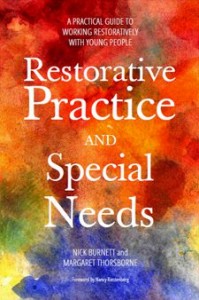
Restorative Practice (RP) is an effective approach to discipline that has the potential to transform behaviour by focusing on building and restoring relationships. This practical guide explains how to implement restorative approaches with young people with special needs in educational or residential settings.
The book explores how RP is being used in general terms and through a number of case studies looks at how RP needs to be adapted for those with additional needs including Autism Spectrum Disorder, ADHD, Foetal Alcohol Spectrum Disorder, Intellectual Disability and communication difficulties. It includes guidance on particular issues such as staff facing crises, the issue of physical restraint and additional support parents require.
The book will be of interest to restorative practitioners, educational professionals including headteachers, teachers and SENCOs in both special education and mainstream schools and residential care leaders and staff.
Purchase in Australia & New Zealand
Purchase in Europe/UK
THE PSYCHOLOGY OF EMOTION IN RESTORATIVE PRACTICE: How Affect Script Psychology Explains How and Why Restorative Practice Works
Edited by Vernon C. Kelly, Jr.
and Margaret Thorsborne
Foreword by Andrew Becroft (272pp)
ASP explains how the central nervous system triggers ‘affects’ which are the basis of all human motivation and emotion. The book presents a clear explanation of what ASP is, how it relates to RP, and how ASP helps practitioners to understand relationships, emotions and dynamics in their work. The chapters are based around case studies which demonstrate RP in criminal justice, organizational and education settings. They show how theory links to practice, and how having a deep understanding of the theory has helped practitioners to be successful in their work.
Providing an accessible explanation of how RP works, this book will be invaluable to all RP practitioners in any setting, as well as RP students and academics.
Scottish Journal of Residential Child Care Review February 2015 Probational Journal Review November 2014 Purchase in Australia & New Zealand
Purchase in Europe/UK
IMPLEMENTING RESTORATIVE PRACTICES IN SCHOOLS: A Practical Guide to Transforming School Communities
(Thorsborne M, Blood P, 224 pp)
Restorative practice is a proven approach to discipline in schools that favours relationships over retribution, and has been shown to improve behaviour and enhance teaching and learning outcomes. However, in order for it to work, restorative practice needs a relational school culture. Implementing Restorative Practices in Schools explains what has to happen in a school in order for it to become truly restorative.
Section 1 explains the potential of restorative practice in schools, describing the positive outcomes for students and teachers. It also outlines the measures that need to be in place in order to embed restorative practice.
Section 2 examines the process of understanding and managing change, providing realistic and pragmatic guidance on the practical and emotional barriers that may be encountered.
Finally, Section 3 provides in eight practical steps, strategic guidance for achieving a restorative culture that sticks.
Featuring useful pro formas and templates, this book will be an indispensable guide for educators, administrators and school leaders in mainstream and specialist settings.
Purchase in Australia & New Zealand
Purchase in Europe/UK
A GUIDE TO WORKPLACE CONFERENCING: A Restorative Approach to transforming workplace conflict
(Thorsborne M, 52 pp)
This manual is the fourth in the series of training manuals designed to assist practitioners with restorative processes in workplaces, whatever the field or occupation. While formal complaint and grievance processes have their place, seldom to they address the emotional harm to people and relationships. Taking a restorative approach to resolving workplace difficulties has the possibility of resolving the issues that have caused such harm when things have gone wrong. This manual offers clear guidance for facilitating the workplace conference process. Thorough training in this process is recommended.
Chapters include:
- A restorative approach
- Doing the groundwork
- Pre-conference interviews
- The workplace conference process
- Managing the emotional dynamics
- Conference follow-up
Appendix includes:
- Interview guidelines
- Participant guidelines
- Conference script
- Blank Agreement
- Participant Evaluation
Purchase online now: Please choose correct postage option for payment below
RESTORATIVE JUSTICE: POCKETBOOK
(Thorsborne M and Vinegrad D, teacher resource, 128pp)
Schools that have adopted the ancient principles of restorative justice in their approach to behaviour management report better relationships with young people, greater engagement in learning and a greater development of social and emotional competence among learners. No surprise, then, that interest in restorative practices is growing.
It’s all about relationships. Wrongdoing is viewed through a ‘relational lens’. All those responsible for and affected by the behaviour are involved in solving the problem. Working in conference with a teacher/facilitator, participants come to understand the harm done to people and relationships. Accepting that such harm creates obligations and liabilities, they then focus on repairing the damage and putting things right.
Expert practitioners Margaret and David provide a thorough grounding in restorative practice, with worked examples and easy-to-follow teacher scripts to get you started. If RJ is new to you, you’ll be a convert in no time!
Purchase in Australia & New Zealand
Purchase in Europe/UK
BUILDING A TRAUMA-INFORMED RESTORATIVE SCHOOL: Skills and Approaches for Improving Culture and Behavior
(Brummer J,Thorsborne M, 240 pp)
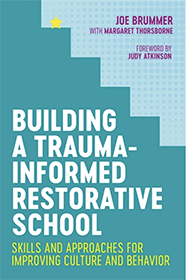
Covering both theory and practice, this book will teach educators everything they need to know about developing restorative practices in their education settings, in a way that is also trauma-informed. The first part of the book addresses the theory and philosophy of restorative approaches, and of trauma-informed and trauma-sensitive schools. The second part outlines the five restorative skills (mindfulness, honest expression, empathy, the art of asking questions and the art of requests), what they look like in practice (including using circles, peer mediation, respect agreements and restorative dialogue), and how to implement them.
Every strategy is clearly explained and adapted to be appropriate for children and adults who have experienced trauma. Everything the book discusses has been especially designed to be adapted for different school settings and their particular challenges.
Purchase in Australia & New Zealand

